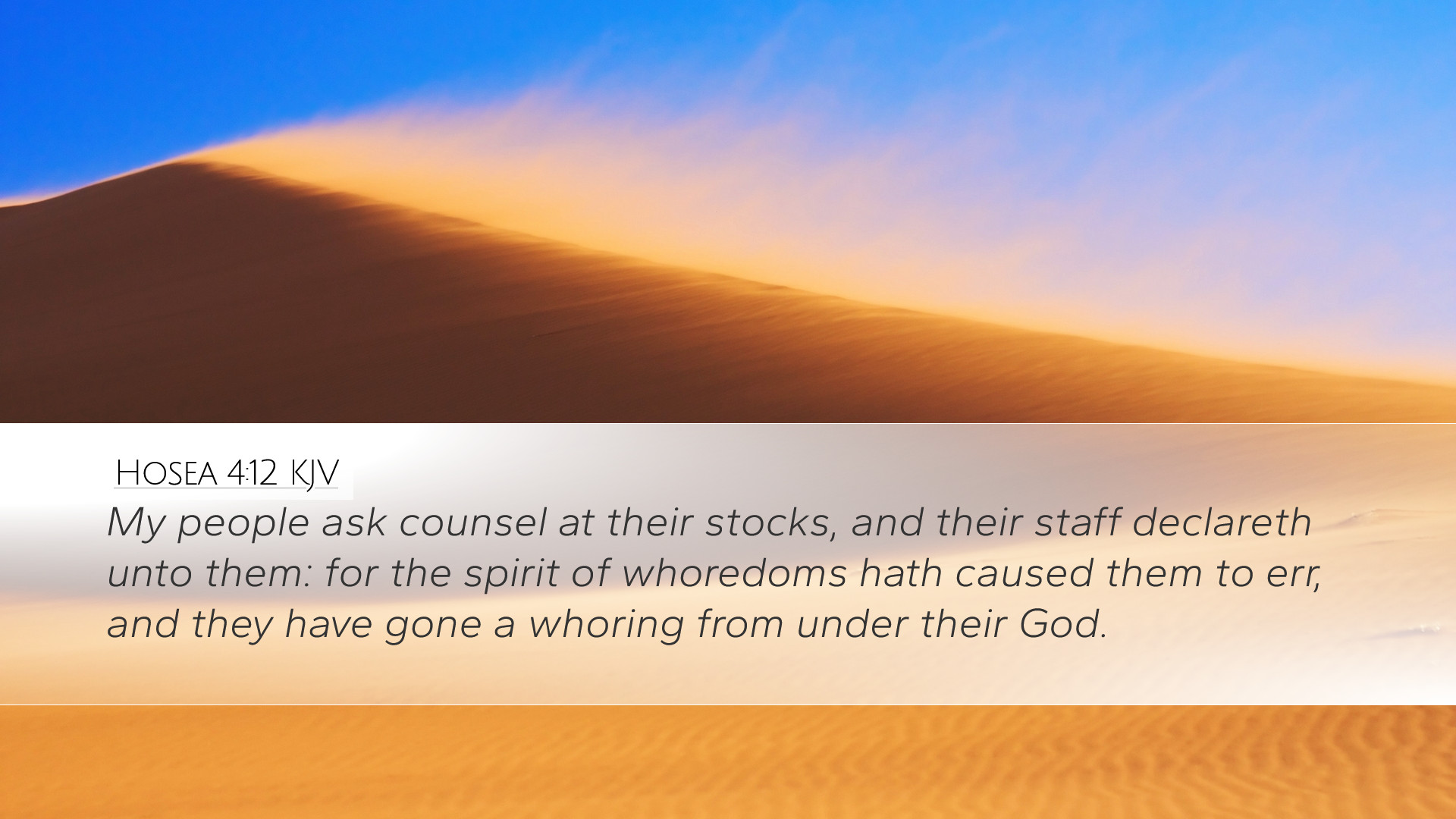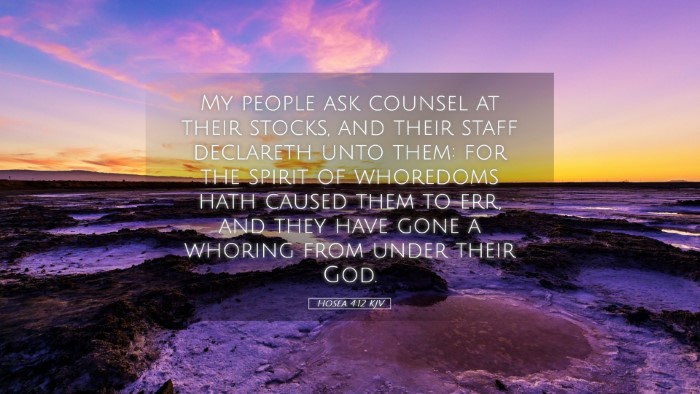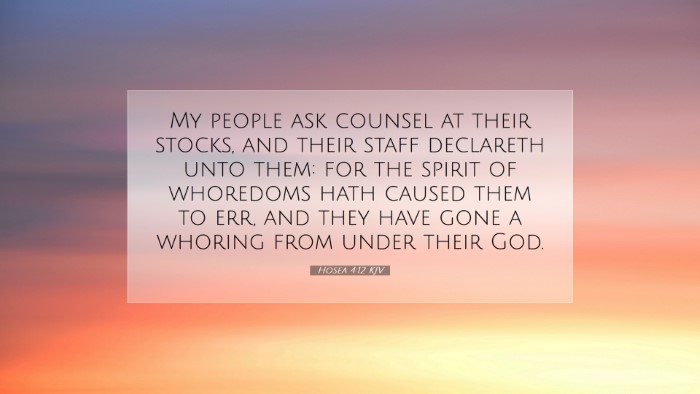Old Testament
Genesis Exodus Leviticus Numbers Deuteronomy Joshua Judges Ruth 1 Samuel 2 Samuel 1 Kings 2 Kings 1 Chronicles 2 Chronicles Ezra Nehemiah Esther Job Psalms Proverbs Ecclesiastes Song of Solomon Isaiah Jeremiah Lamentations Ezekiel Daniel Hosea Joel Amos Obadiah Jonah Micah Nahum Habakkuk Zephaniah Haggai Zechariah MalachiHosea 4:12
Hosea 4:12 KJV
My people ask counsel at their stocks, and their staff declareth unto them: for the spirit of whoredoms hath caused them to err, and they have gone a whoring from under their God.
Hosea 4:12 Bible Commentary
Commentary on Hosea 4:12
Verse Reference: Hosea 4:12 - "My people ask counsel at their stocks, and their staff declareth unto them: for the spirit of whoredoms hath caused them to err, and they have gone a whoring from their God."
Introduction
This verse from the book of Hosea epitomizes the dire spiritual condition of Israel at the time. Hosea, a prophet known for his vivid imagery and potent messages, speaks to the deep-seated idolatry and the consequent estrangement from God that characterized the nation.
Contextual Analysis
Hosea’s message is set against the backdrop of a covenant community turned disloyal to Yahweh. Throughout the book, a recurring theme is the infidelity of Israel, likened to marital unfaithfulness. The metaphor of whoredoms represents not just infidelity but a spiritual adultery against the covenant God who is portrayed as a jilted husband.
Matthew Henry's Insights
Matthew Henry comments on the proclivity of God's people to seek guidance from inanimate objects—represented here by “stocks” and “staff.” He notes that this is indicative of a deeper issues within the community, as they have forsaken the living God for lifeless idols. Henry implies that this quest for counsel from idolatry was a result of spiritual blindness and unfaithfulness, caused by the allure of false religions.
Albert Barnes' Commentary
Albert Barnes elucidates that the term "stocks" refers to wooden images or idols, hinting at the primitive nature of the idolatry in Israel. He emphasizes that instead of seeking divine revelation through prayer or prophetic guidance, the people consulted these idols. Barnes highlights the gravity of their situation where their perception of wisdom came not from the God of Israel but from these false entities. Barnes concludes that such reliance on false guidance led to moral degradation and estrangement from God.
Adam Clarke's Perspective
Adam Clarke takes a psychological approach, suggesting that the people’s dependence on idols signifies a misalignment in their understanding of worship and guidance. He points out the phrase "the spirit of whoredoms" as key to understanding this perverse behavior—indicating a mindset captivated not merely by sin but by a systemic addiction to falsehoods that led them away from knowledge of God. Clarke further addresses the implications of being misled by such spirits, which corrupt the mind and lead one away from divine truth.
Theological Implications
This verse has significant theological implications, especially when viewed through the lens of divine revelation versus human innovation. The Israelites' choice to consult ihre idols represents a rejection of God's sovereignty in favor of self-made solutions.
Idolatry and Deception
A salient point across all commentaries is the notion that idolatry directly correlates to deception. The people have let fabricated narratives steer their lives, a reflection that remains relevant today. The challenge for modern believers lies in recognizing contemporary forms of 'stocks'—anything that distracts or diverts one from seeking God earnestly.
Consequences of Erring from God
Both Henry and Barnes touch on the consequences that arise from such errant behavior. A nation that turns away from God can expect divine judgment; this judgment is both a spiritual condition and a literal consequence of their choices. Clarke’s commentary reinforces this by highlighting the internal struggles that follow when one departs from divine guidance, leading to a chaotic society entrenched in sin.
Practical Applications
For contemporary pastors, students, and theologians, Hosea 4:12 serves as a crucial reminder of the importance of fidelity to God above all else.
- Self-Examination: Believers are encouraged to examine their own lives for any forms of idolatry that may have taken root, recognizing that anything that obstructs their relationship with God must be addressed.
- Prioritizing God’s Counsel: The verse beckons a return to seeking guidance through prayer, scripture study, and wise counsel from fellow believers rather than worldly wisdom.
- Understanding the Role of Idolatry: It’s essential to engage in robust theological discourse surrounding the nature of idolatry today, recognizing how modern distractions can lead to spiritual barrenness.
Conclusion
Hosea 4:12 encapsulates the perils of forsaking God for false counsel and highlights the broader consequences of spiritual infidelity. By drawing from the insights of Matthew Henry, Albert Barnes, and Adam Clarke, contemporary readers can glean profound truths about the nature of idolatry, the importance of divine guidance, and the need for a renewed commitment to God in a world rife with distractions.


